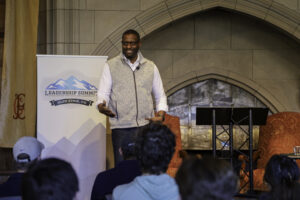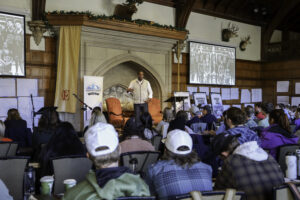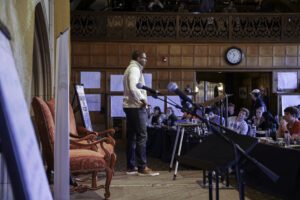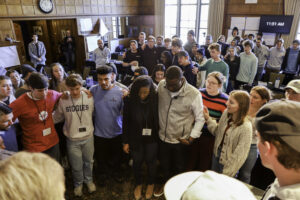Written by special contributor Lance Fleming
 The headlines splashed across newspapers and websites around the country last December and into January certainly weren’t flattering for Southwest Airlines. The airline –annually among the leaders of all airlines in the United States in customer satisfaction – wasn’t making anyone happy with thousands of delayed or canceled flights that left travel-weary customers stranded in airports across the country as they scrambled to return home after the holidays.
The headlines splashed across newspapers and websites around the country last December and into January certainly weren’t flattering for Southwest Airlines. The airline –annually among the leaders of all airlines in the United States in customer satisfaction – wasn’t making anyone happy with thousands of delayed or canceled flights that left travel-weary customers stranded in airports across the country as they scrambled to return home after the holidays.
A massive winter storm caused the initial flight delays and disruptions and turned into a disaster that cost more than $800 million in lost revenue and refunds and reimbursements to customers.
Customer satisfaction fell off, and many Southwest passengers swore they’d never use the airline again after the experience.
Standing in the middle of the storm was ACU graduate Tony Roach (’01), who has been with the airline since 2001, shortly after he graduated with a BBA in Marketing and Management. He started at Southwest as a Field Marketing Coordinator, working his way up the corporate ladder by serving in customer-impacting roles across field marketing, corporate sales, product development, loyalty marketing, customer relations, and customer experience.
Roach has also been tasked with establishing the customer experience corporate function, leading the Southwest Promise (the company’s COVID response for customers), spearheading the digital self-service and cabin modernization programs, and executing several other impactful initiatives that continue to generate revenue and improve customer satisfaction.
Southwest Promise (the company’s COVID response for customers), spearheading the digital self-service and cabin modernization programs, and executing several other impactful initiatives that continue to generate revenue and improve customer satisfaction.
In January 2023, he was promoted to Senior Vice President for Marketing and Customer Experience. He will lead the company’s efforts in marketing, product & customer loyalty, digital, customer experience, and customer engagement. Roach’s organization drives customer demand, evolves the Southwest brand, and designs an end-to-end travel journey that maximizes revenue and customer loyalty.
All that to say that Roach leads the departments that have to restore trust in the Southwest brand and win back the customers who were turned off by the problems they experienced during the company’s nightmare winter.
Roach –married and has four children – was recently asked to speak to faculty and students at the annual Leadership Summit in Colorado, touching on various aspects of his Christian leadership style in a secular world and how he has helped lead Southwest Airlines through its most recent trials.
He recently sat down for a question-and-answer session covering everything from his experiences at ACU and in COBA to the company’s response to COVID and the holiday crises. Below is that conversation:
Q: When you look back on your experience at ACU and in COBA, who are some of the people who most influenced you, and what did you take away from them that you’ve carried with you in the corporate world?
 Roach: There are so many people across COBA that I could name. I might not have had direct contact with them, but I recognized they were trying to do things the right way, which made an impact. I really looked up to Dr. (Rick) Lytle, Dr. (Phil) Schubert, and Tim Johnston. Dr. (Gary) McCaleb was one of the most influential people on campus, and I’m forever indebted to him. I was one of the founding members of the LYNAY (Love Your Neighbor As Yourself) group that he led for many years, and he poured into and invested in me. He influenced me in so many ways, including pushing me to strive to be the best I can be in every facet of my life, whether it be in my spiritual life, family, or job. He saw more potential in me than I even saw in myself.
Roach: There are so many people across COBA that I could name. I might not have had direct contact with them, but I recognized they were trying to do things the right way, which made an impact. I really looked up to Dr. (Rick) Lytle, Dr. (Phil) Schubert, and Tim Johnston. Dr. (Gary) McCaleb was one of the most influential people on campus, and I’m forever indebted to him. I was one of the founding members of the LYNAY (Love Your Neighbor As Yourself) group that he led for many years, and he poured into and invested in me. He influenced me in so many ways, including pushing me to strive to be the best I can be in every facet of my life, whether it be in my spiritual life, family, or job. He saw more potential in me than I even saw in myself.
Q: Tell me about the company’s response to the COVID pandemic and what you learned from dealing with all the issues that came about.
Roach: The entire industry was hit hard by COVID because so little was known about how the virus spread. The last thing people thought they needed to do was to get on an airplane. We had to modify how we operated and what the experience would be like for those willing to fly. We did many things like requiring masks and blocking middle seats onboard for social distancing; we even changed how we cleaned the plane after each flight. And we did all those things to help make people comfortable flying again. If you think about what that did to business travel, everything stopped because no one was going to the office. Our team led the customer response, and the lesson learned was that you have to adapt and be ready to pivot.
Q: Go back to the challenges that Southwest faced during the winter with the thousands of flight delays and cancellations, as well as, I’m sure, thousands of unhappy customers. How does Southwest rebuild trust with the public?
Roach: Southwest takes immense pride in taking care of its customers. It’s a huge part of our business model. To see us get to a point where we let a lot of customers down was disheartening for the executive team and frontline workers. It was a hard thing to watch, and it’s been hard to navigate. The first thing we had to do during that time was care for our customers. We had to make sure they knew they could get a refund and that we would help make them whole in other areas. That was the first big thing we did. Now we’re working on rebuilding trust with customers. We’ve always had a great brand, but we recognize that rebuilding trust takes time. So how do you do that? For one, you accept the lessons you learned and make sure you move forward and improve yourself. The second thing is consistency. We have to show we can once again be reliable, and over time we will show that. We’re still the airline everyone has loved for so long, and we’ll come out of this better and stronger. Those are tangible things that we can show customers and employees that we will be better.
Q: In these challenges you’ve been dealing with, how much did you lean on what you learned from your father (Abilene minister Dr. Tony Roach) and at ACU about leading with Christ-centered values?
Roach: You can try to remember some of the subject matter you learn in school, but there are things you learn in the curriculum, and there are things you learn outside the curriculum. What ACU does is teach you that you can balance a lot of things at once. At ACU, you learn to balance your walk with Christ and academics. You’re blending two things. But I had three when you added athletics (Roach was on the ACU men’s basketball team). Understanding how to pursue and balance what is important to you at once is a skill that can continue to bless your life. I’ve also been lucky to have a father who has given me guidance along the way. He taught me that if you consult with God and walk with Him and abide with Him, He has your back, which keeps everything in perspective. He’s given me a great example; somebody to watch and do things with the right intent.
the curriculum, and there are things you learn outside the curriculum. What ACU does is teach you that you can balance a lot of things at once. At ACU, you learn to balance your walk with Christ and academics. You’re blending two things. But I had three when you added athletics (Roach was on the ACU men’s basketball team). Understanding how to pursue and balance what is important to you at once is a skill that can continue to bless your life. I’ve also been lucky to have a father who has given me guidance along the way. He taught me that if you consult with God and walk with Him and abide with Him, He has your back, which keeps everything in perspective. He’s given me a great example; somebody to watch and do things with the right intent.
Q: You were recently asked to speak at Summit and share your last few months’ experiences. What was your goal in communicating with those students and staff members?
Roach: I was reminiscing that I went to Summit my last year at ACU, so this was a chance to pour back into students sitting in the seats where I once sat. They have so many decisions to come in life and where they’re at. I remember being somewhat overwhelmed by all the decisions that were coming. How do you know what you want to do? If someone had told me then that I’d be doing what I’m doing now, it would have blown me away. I wanted to give them a few things to consider, led by this: what do you think are the principles you need to stay loyal to as you make those decisions? If you remain loyal to the guiding principles, they’ll help guide decisions. And then, I wanted to remind them to be loyal to the gifts that God has given them. We each have values, and if you stay loyal to those, your gift will find its way to you. I reminded them to remain loyal to the Holy Spirit. The gift that God gave all of us is the Holy Spirit. If we stay loyal to listening to the Holy Spirit, that will lead us on our path. Finally, I reminded them to stay loyal to our mission as Christians. We serve the Kingdom. If we stay loyal to serving the mission of the Kingdom, that will guide us in all the decisions we make. My goal through all of that was to tell them it’s OK if they don’t know yet where to go from here. But to stay loyal to their principles because they will guide their paths.